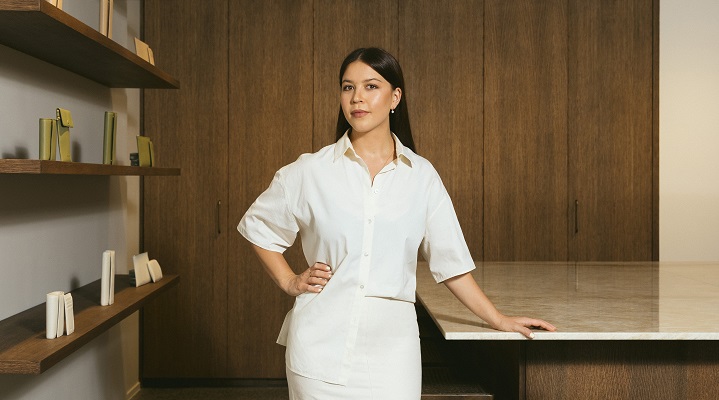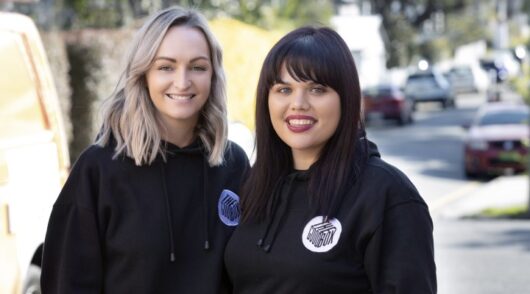Since launching in 2015 to fill a gap in the designer handbag market, Yu Mei has built a loyal customer base in New Zealand, and now it’s looking to do the same in Australia and beyond. Here, founder Jessie Wong explains the brand’s origin story, her love for bricks-and-mortar retail and her unique approach to community engagement. Inside Retail: For those who aren’t familiar with Yu Mei, how would you describe the brand, and what’s the story behind the launch? Jessie Wong: Yu Mei
u Mei was fundamentally started because I couldn’t find a bag that would fit everything I needed in the day. My laptop, my lunchbox, my visual diary, my phone charger, my laptop charger, my makeup bag – really the kitchen sink.
To me, it was really interesting that a solution for this problem didn’t exist. A lot of the beautiful handbag designs that fit my aesthetic values were based on this blueprint of a woman’s role in society 100 years ago. It was the Chanel framework, where it was about fitting your lipstick and your love letters and that’s it. Our biggest competitor was a canvas tote – there was nothing on the market that could seamlessly move through your day with you.
At the time, I was studying [fashion design] in Dunedin in Central Otago, and there was a tannery that was pretty close to us that used to send us offcuts, so I got to learn to use deer nappa [leather], which is what Yu Mei is really well known for. It’s actually a waste material that would otherwise be landfilled. It’s the perfect hybrid between a cow hide and a lamb skin, so it’s buttery soft, but strong enough to carry your laptop around. We’re really proud to use that material, which is the byproduct of the land.
I would describe a Yu Mei bag as a really utilitarian item made from regenerative materials with a lot of integrity.
IR: It sounds like you were quite young when you started Yu Mei. What were some of the major challenges you faced early on?
JW: Some of the challenges had to do with the supply chain and getting tanneries and big suppliers like YKK Japan to take me seriously, and to realise that I wasn’t just a student wanting to place an order, I was trying to start something. It took a while to develop those relationships, but that’s an area we’re really strong in now. We keep the supply chain really close; it’s like family to us.
New Zealand is a small industry, so you have to be able to cover a lot of areas yourself. The first 500 bags that we produced were made solely by me. Eventually, our production manager, Adrian, came on board and helped me make them, and we grew our team from there. A really proud moment was when we were able to make the jump to a manufacturer who could improve on our craftsmanship. But those first couple of years were so much fun. I remember having calluses on my hands for years after that from all the bags that we produced. Leather craft is a tough gig; it’s definitely a bit of a dying art.
Building our supply chain took a long time, but I was very hesitant to go out and grow the brand and make sales to international retailers until it was really solid. Over the last two years, during the pandemic, we’ve been able to focus more on stabilising the business here in New Zealand, so building out a retail footprint – which includes a store in Wellington just downstairs from our office and two in Auckland. One is in Commercial Bay, which is in the CBD – that opened in June 2020, so right at the beginning of the pandemic – and one is in Newmarket. That’s a larger Yu Mei Lounge concept store and it opened in April 2021.
IR: What have you learned since opening bricks-and-mortar stores?
JW: One thing that I absolutely love about having stores is that they’re a place for us to connect with our community. When we were an e-commerce business and did wholesale, that was great, but we never actually got to meet the customer. In the first couple of years of the business, I realised the best thing for me was being able to talk to the customer and learn who they were and what they were about.
We started doing these one-day retail events and pop-ups, and we found that people wouldn’t just come and buy something and leave, they were really a place of connection. What would happen is that groups of friends, or mums and daughters, would come in and look at the range and start pulling all the bags down from the shelves. The environment was really friendly and non-elitist, which is not very common for leather goods.
When we went to architects to start designing the stores, the brief was one word: residential. We wanted people to feel like they were coming into our home, where they could feel free to sit down and take their time and have conversations with us, where they could learn something about the brand, and we could learn something about them that might inform future design. And it does. We host events all the time where we get the opportunity for feedback. That’s the concept of the Yu Mei Lounge, and we’ve done different iterations of that through experiments within our retail presence so far.
IR: What does Yu Mei’s presence in the Australian market look like? I know you were part of The New Zealand Design Edit at David Jones a few months ago.
JW: We are quite new to the Australian market. Our first time experimenting with the market was back in 2021, with the Discover New pop-up at Chadstone, and now with the Design Edit. It’s been a really great way to bring some more attention to the brand. We’ve worked with David Jones for about three years now, and we have a really great partnership with them. We’re in about eight or nine David Jones locations in Australia, and have been since mid-2020, but prior to that, we were in David Jones in New Zealand. Most recently, at the launch of the Design Edit, Yu Mei sold out at David Jones’ Elizabeth Street flagship store, which was an exciting moment.
We’ve also partnered with Harrolds in Melbourne, and we have another three or four stores coming online this year, which is very exciting for us. Our goal is to expand our footprint in Australia, grow our community, Club Yu Mei, and bring the products that New Zealanders love so much over to an Australian customer.
IR: The Design Edit highlighted some great New Zealand brands that are punching above their weight. What do you think is behind that?
JW: One thing I hear a lot is that New Zealand businesses not only have great products and services, but also, they’re always thinking about their wider impact and being in some way good for the world. It’s that Kaitiakitanga aspect, [a Maori word that means] guardianship of the land and caring for something bigger than what’s right in front of you.
IR: What do you see as the biggest growth opportunities for Yu Mei in the next few years?
JW: In New Zealand, one of the biggest opportunities for us is to expand our product range. We have a deep loyalty in our customer base, but we have a limited range of products. Once you’ve purchased a full set of our ‘art of packing’ system, there’s not much else. We’re working on that as an area for the business here.
And then, in Australia, we’re just at the beginning of saying hello, and I think there’s plenty of opportunity. The market is quite different to New Zealand, but we’re working with brand strategists, who are very tapped into the local community, and it’s been a really good way for us to understand the needs of the customer and find our niche. We’ve made some really good headway since we’ve been doing activity in-market.
IR: Besides the Design Edit, what are some of the things you’ve done to grow your brand awareness in Australia?
JW: Earlier this year, we hosted an invitation-only showroom in Sydney, where we met with media, stylists and friends of the brand. We also started hosting Club Yu Mei lunches and dinners in Sydney and Melbourne. They are very private affairs, with a select group of 12 or 15 people who are aligned with the brand. We just spend a really concentrated amount of time getting to know them.
In May, we showed at Australian Fashion Week at the Sydney Opera House. That was in collaboration with Esse Studios, and it was one of the standout shows of the week. It was like a match made in heaven, and we got a lot of press off the back of that. There were a lot of Australian buyers who picked up the brand in London after seeing it in Australian Fashion Week, so there will be lots of exciting retail partnerships coming this year.
IR: Tell me more about Club Yu Mei. It sounds like it’s much more than a traditional loyalty or rewards program.
JW: It really developed quite organically. We had this strong brand loyalty with our customers in New Zealand. I think a lot of that was built through people following our journey on Instagram and being a part of it. I have a little piece of paper in my office, which is from the very beginning of Club Yu Mei. It says, ‘Club Yu Mei is a community of like-minded, forward-thinking individuals. It’s an inclusive space by real people, for real people.’
It’s basically a group that you can sign up to and unlock extra benefits online and off. Those can be everything from digital drinks to real-life dinner parties, to our archive events, to digital runways – all sorts of things that we do throughout the year, to which Club Yu Mei members are invited.
It came into being when the pandemic happened. In effect, we had been given 48 hours’ notice by the prime minister to prepare for lockdown, which was going to last for an unknown period of time. We had been quite prepared for something like this. I’m half-Chinese, and my dad reads a lot of Chinese news, and he’d been saying since January [2020] that something was going to happen, so we’d had a bit of time to mentally prepare.
When we got that notice of the lockdown, a team member and I stayed behind and photographed every single archive bag that we had. These are bags we create by taking all our scraps and any last little bits of hardware and making one-off pieces that have multiple colourways and panels that aren’t in our main line. I always thought these items would be less coveted, but because they are one-offs, they’ve ended up going the other way.
We used to sell them at one-day archive events to get rid of all of our scraps. But obviously we weren’t going to be able to do that with the lockdown, so we photographed every single one, took the SD card to our photographer’s house and threw it over the fence. He edited all the photos, and we worked with our web developers to pull together a one-day digital event. What happened was that 11,000 people showed up, and we were just astounded. We would maybe get 400 people [at an in-person event], which was a lot. I couldn’t even fathom having 11,000 people in a room. We sold out over 600 bags in 16 minutes, and we realised the power of digital and how many people were behind us and backed us.
Later on that year, in October, Club Yu Mei was born. It was a framework in which people could participate in the brand and engage with us, and we could learn about them and vice versa. It’s been a lot of fun so far, and there are other benefits and pieces of that puzzle that we’re wanting to build out over time.
IR: Can you share how many people are part of Club Yu Mei now?
JW: It’s about 20,000.







